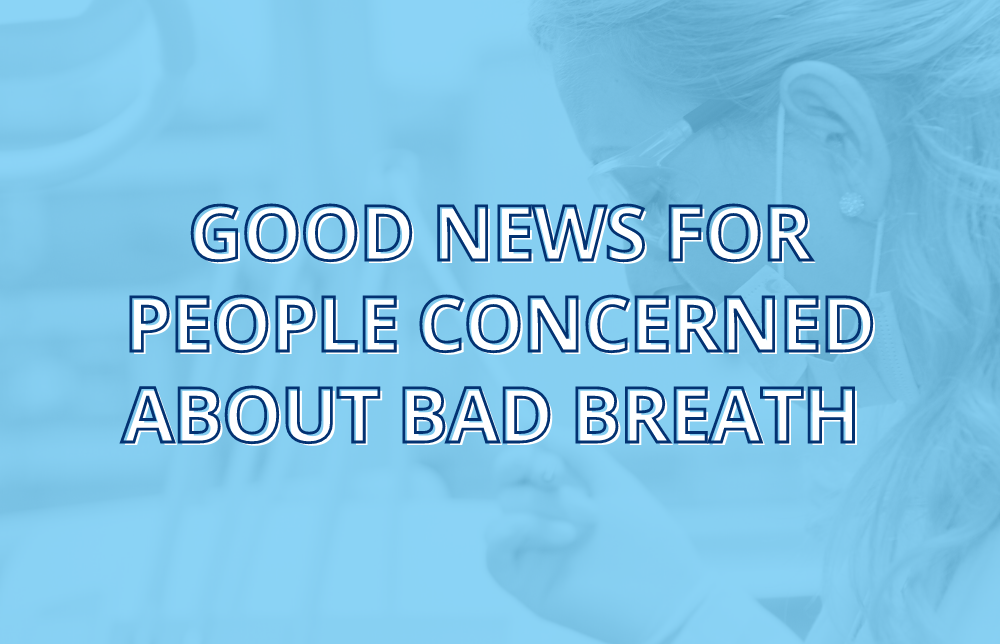
Good News About Bad Breath
January 27, 2023
You may have noticed bad breath seems to get worse as we get older. You're not alone. The number of people suffering from halitosis is surprisingly high: About 50% of the US population suffers from bad breath. Unfortunately, as we age, we’re more prone to halitosis. But don’t worry. With a little extra effort, you can refreshen your breath and you can breathe a big, fresh, sigh of relief.
Why Can Older People Have Bad Breath?
Halitosis has many possible causes that can include diet, hygiene, or even potential underlying health issues.
In terms of diet, you may enjoy common culprits like drinking alcohol, tobacco, and foods like garlic, onions, and many spices. But those around you may not enjoy the effect these things have on your breath. Try avoiding these things for a week or two and see if your breath improves as a result.
Hygiene is also simple enough. Make sure your dental care routine includes brushing twice a day, flossing, and even using mouthwash and/or tongue scraper.
If making these changes don’t improve your breath, there might be an underlying health issue.
Various underlying health conditions can cause halitosis.
- Periodontal disease is one of the most common health-related causes of chronic bad breath, particularly in aging populations. 70% of U.S. adults over the age of 65 have periodontal disease. Periodontal – or gum - disease is typically a result of plaque collecting on your teeth and gums.
- Dry mouth, or xerostomia, is another common cause of bad breath in aging populations. You may be wondering why dryness in your mouth would create an unpleasant odor. It's simple. Suppose you don't have enough saliva to wash away food particles. In that case, the particles can collect on your teeth and gums, causing the growth of bacteria. Aging doesn’t cause dry mouth, but some medications to treat chemotherapy, autoimmune diseases, diabetes, or alcoholism can trigger it. Regardless of the cause, sipping water or chewing sugar-free gum throughout the day can help.
- Wearing dentures can also cause halitosis. Food can build up in hard-to-reach areas, allowing bacteria to grow. A more stringent cleaning routine of your artificial teeth could rid your mouth of any unwanted odors.
Your dental professional is the person best suited to diagnose any potential health or hygiene issues. They will likely be able to remedy the issue quickly with a routine cleaning and removing any tartar deposits you may have so your gums can heal. It’s just one more reason why regular checkups are so important. IRTA and AMBA are here to help you keep your mouth healthy with a Dental Plan that includes coverage for routine cleanings as well as many procedures including fillings, crowns, implants, and more. Sign up now at www.AMBAdentalvision.com or call 866-979-0497.
RECENT POSTS
AMBA’s Essential Insights in Dental Health: Understanding Cavities
Have you ever experienced pain or noticed persistent sensitivity in your teeth? You might have a cavity. Cavities are common,
Read More
Keep “Looking” Your Best: The Unique Eye Health Challenges for Women Over 55
March is Women’s History Month, a time to celebrate women's contributions to American history and society. It’s
Read More

Leaving Your Home To A Loved One
If you’re like many people, your home represents more than just financial value. As the saying goes, "Home is where the
Read More

The Top Scams to Watch Out for in 2025
In our increasingly digital world, the top scams continue to evolve, with fraudsters developing new and sophisticated ways to
Read More

